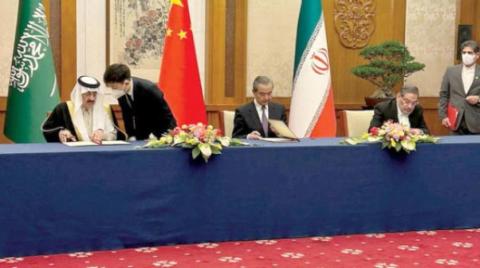
China’s economy is slowing, which is both inevitable and alarming. Inevitable because no economy can defy gravity and grow at nearly double-digit rates on average for three decades, as China’s did from 1989 through 2018. And alarming because the Middle Kingdom contributes about one-third of global growth annually and its massive demand engine for commodities, goods and services has been a boon to the global economy.
To borrow a well-worn phrase about the US economy: When China sneezes, does the world economy catch a cold? Already, three major global enterprises have declared that the China sneeze has given them the chills. Caterpillar, the world’s largest maker of construction equipment, missed its fourth-quarter earnings targets owing partly to slowing demand in China, which accounts for some 10 percent of company sales. The stock was battered, falling up to 10 percent as fears of further China slowdown looms. Two other major global players, the semiconductor maker Nvidia and the global smartphone behemoth Apple Inc., have attributed earnings shortfalls to the slowdown in China.
Policymakers and corporate executives from Washington to Wellington are watching the China growth story with intense interest. At a time of only modest growth in Europe and rising uncertainty about US growth prospects in 2019, China’s growth remains vital to the health of the global economy. Already, several Asian economies, including Hong Kong and Japan, have reported significant downturns in exports owing to the China slowdown and supply chain disruptions caused by US-China trade tensions.
As the No. 1 and No. 2 economies in the world square off, with deadlines looming for escalating trade tariffs unless an agreement is reached, the rest of the world can only watch and hope that some semblance of stability will be restored.
What does all of this mean for the Middle East region?
Policymakers from Washington to Wellington are watching the China growth story with intense interest.
Afshin Molavi
No part of the world is immune to global economic slowdown, so the region will be hit in multiple ways if China’s growth collapses, triggering a global recession. Even the more likely and less alarming scenario — a flattening of China’s growth — will act as a drag on the global economy, affecting countries across the region, from the populous mostly oil-importing states of North Africa to the smaller hydrocarbon-exporting economies of the Gulf Cooperation Council (GCC) states.
Let us take a look first at North Arica. Morocco, Tunisia and Egypt benefit from being a part of European manufacturer supply chains, from aircraft to autos to auto parts, and also receive large numbers of European tourists. Germany, the engine of the EU’s economy, felt a sharp slowdown in 2018, owing partly to slowing exports to China. Most forecasts see sluggish growth for the euro zone in 2019.
A sluggish Europe will hurt several North African states, slowing their exports and diminishing the number of European tourists that flock to their Mediterranean beaches and historic capitals. Chinese state enterprise investment in Egypt has boosted the country’s transport infrastructure and its connectivity to trade, but pledges of major investments in construction projects, including the building of a new capital city outside of Cairo, could be under threat from a China slowdown.
As for the GCC states, as well as Iran and Iraq, their geo-economic outlook is far more Asian than European. China ranks at or near the top of their list of oil and gas buyers, and Chinese companies have begun investing more robustly across the GCC region and North Africa. But it is not only China. Japan and South Korea have been major buyers of the UAE and Saudi crude for decades, and companies from both countries are actively engaged across the GCC. Both Abu Dhabi and Riyadh have also demonstrated a clear interest in rising strategic ties with India to complement a growing and robust commercial relationship.
On a recent visit to Dubai and Abu Dhabi, several high-level corporate executives expressed to me their excitement about prospects for India growth and worry about US-China trade tensions derailing the global economy. Meanwhile, Association of Southeast Asia Nation (ASEAN) economies are not immune to the China slowdown either, potentially slowing the growing ASEAN demand for Middle East oil and gas.
To be sure, amid all of the talk of a China slowdown, it should be remembered that its economy still posted 6.6 percent growth in 2018 — an enviable rate for most countries. Still, it is a measure of the weight of China’s economy, and the global addiction to China’s demand engine and Chinese investment, that has led us to this current juncture.
That is why Middle East policymakers and businesses will surely be paying close attention to the ongoing US-China trade negotiations. Their results will reverberate across the world.
Afshin Molavi is a senior fellow at the Foreign Policy Institute of the Johns Hopkins University School of Advanced International Studies, and editor and founder of the newly re-launched The New Silk Road Monitor. Twitter: @afshinmolavi
Disclaimer: Views expressed by writers in this section are their own and do not necessarily reflect Arab News" point-of-view












